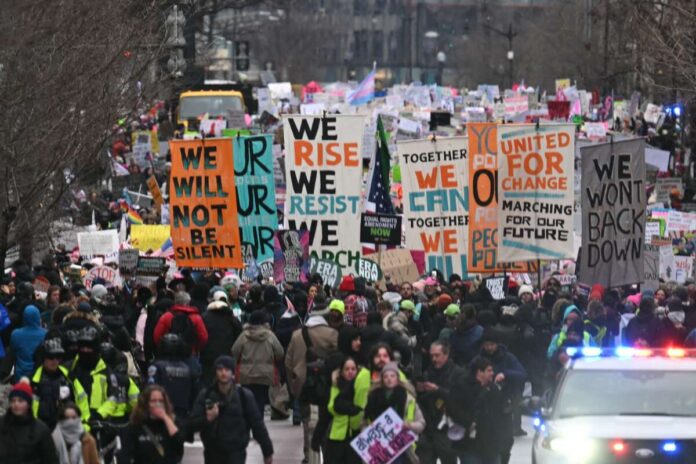As President-elect Donald Trump’s inauguration day approaches, grassroots groups around the country are gearing up for protests. Under the slogan “We Fight Back 2025,” more than 700 demonstrations are set to take place on January 20. These protests are being organized by various groups, including the People’s Forum and the Palestinian Youth Movement.
In New York City, people will gather in Washington Square Park to speak out against what they see as the growing influence of the wealthy elite. They plan to raise their voices for workers’ rights, immigrant rights, environmental justice, and to call for an end to the violence in Gaza and U.S. military interventions. Their aim is to demand a future where the needs of the people take priority over corporate interests.
Down in Miami, the local chapter of the Democratic Socialists of America (DSA) is leading the charge. Working alongside groups like Black Workers for Justice and the Communist Workers Party USA, they are organizing a protest to stand against the incoming administration’s policies, which they believe will harm marginalized communities.
Adam Medina, a key organizer for the Miami protest, says the event is a way to push back against the far-right agenda that Trump is expected to champion. He points out that this administration will likely make life even harder for people who are already struggling, such as undocumented people, transgender individuals, Black Americans, and people in Gaza. He stressed that the protest is about more than just resisting Trump – it’s about demanding real, systemic change.
Medina also made it clear that the protest isn’t just about opposing Trump. It’s about rejecting both the Republican and Democratic parties. He explained that the Democratic Party, though it may differ from Trump on some issues, still represents the same ruling class that benefits from the current capitalist system. According to Medina, the real solution is for working people to build their own movement for change, rather than relying on established political parties.
Looking back at the past four years, Medina noted that the fear of repression has grown, especially among marginalized groups like transgender people, who are particularly vulnerable under Trump’s policies. He pointed out that the last few years have seen a rising wave of dissent, particularly from young people. Student protests over the situation in Palestine were a clear sign that this generation is not willing to sit by while injustices happen.
At the protest in Miami, attendees can expect speeches, chants, and a focus on unity among different working-class communities. The action is designed to highlight the struggles of transgender, Black, and undocumented people, as well as other working-class groups, while rejecting the false choice between the two major political parties.
Medina also emphasized the importance of building a stronger labor movement that can work with socialist organizations to challenge the system. He believes that the labor movement must evolve into something that fights for more than just better working conditions – it must also address the root cause of workers’ exploitation: capitalism itself. He argued that the labor movement must radicalize and focus on changing the system at its core.
Medina concluded by calling for an increase in strikes and protests, warning that as Trump’s administration pushes forward with its agenda, it will be up to the people to rise up and demand change.





